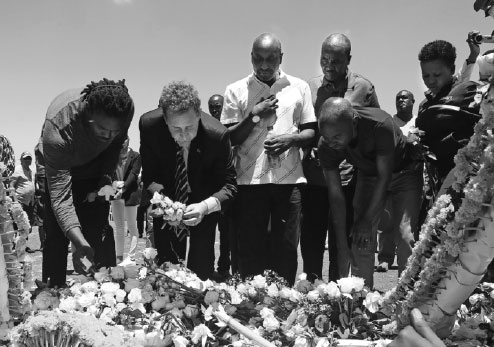Mass funeral held for jet crash victims
Voice and data 'black boxes' found in wreckage and investigation underway
Thousands mourned the Ethiopian plane crash victims on Sunday, accompanying 17 empty caskets draped in the national flag through the streets of the capital as some victims' relatives fainted and fell to the ground, The Associated Press reported.
The service came one day after officials began delivering bags of earth to family members of the 157 victims of the crash instead of the remains of their loved ones because the identification process is expected to take such a long time.
Family members confirmed they were given a 1 kilogram sack of scorched earth taken from the crash site. Many relatives already have gathered at the rural, dusty crash site outside Ethiopia's capital.
The 157 victims of Ethiopian Airlines Flight 302 came from 35 countries and included many humanitarian workers headed to Nairobi.
Elias Bilew said he had worked with one of the victims, Sintayehu Shafi, for the past eight years.
"He was such a good person," Bilew said. "He doesn't deserve this. He was the pillar for his whole family."
Meanwhile, French crash investigators said on Saturday night they had retrieved the cockpit voice recorder files and transferred them to the Ethiopian investigation team.
The French investigation agency BEA also said that its investigators had resumed work on the flight's data recorders.
The voice and data recorders, also known as black boxes, were sent to France because the BEA has extensive expertise in analyzing such devices. Experts from the US National Transportation Safety Board and the plane's manufacturer Boeing are among those involved in the investigation.
The US Federal Aviation Administration said regulators had new data from satellite-based tracking that showed the movements of Ethiopian Airlines Flight 302 were similar to those of Lion Air Flight 610, which crashed off Indonesia in October, killing 189 people.
Both planes flew with erratic altitude changes that could indicate the pilots struggled to control the aircraft. Shortly after their takeoffs, both crews tried to return to the airports but crashed.
While experts say it is too soon to know what brought down the Boeing 737 MAX 8 on March 10, aviation authorities worldwide have grounded Boeing's 737 MAXs, as concerns over the plane caused the company's share price to tumble.
Boeing said it supports the grounding of its planes as a precautionary step, while reiterating "full confidence" in their safety.
Unusually high speed
In Addis Ababa, a source who has listened to the air traffic control recording of the plane's communications told Reuters that Flight 302 had an unusually high speed after takeoff before the plane reported problems and asked permission to climb quickly.
A voice from the cockpit of the crashed Boeing 737 MAX requested to climb to 14,000 feet (4267 meters) above sea level - about 6,400 feet above the airport - before urgently asking to return, the source said on condition of anonymity because the recording is part of an ongoing investigation.
The plane vanished from radar at 10,800 feet.
"He said he had a flight control problem. That is why he wanted to climb," the source said, adding there were no further details given of the exact problem and the voice sounded nervous.
Experts say pilots typically ask to climb when experiencing problems near the ground in order to gain margin for maneuver and avoid any difficult terrain. Addis Ababa is surrounded by hills and, immediately to the north, the Entoto Mountains.
Eric Feron, professor of aerospace software engineering at the Georgia Institute of Technology, told Xinhua News Agency that there was a cross-compatibility problem with Boeing's willingness to make the 737 MAX 8 be "the same aircraft" as the previous 737 models, while improving its fuel consumption.
Feron said aircraft manufacturers and subcontractors were very averse to making big changes to existing flight software for fear of a complete new certification, but local changes to software, or adding a new piece of software, can have vast and hard-to-predict impact on the entire system, which made things "dicey".
Some analysts are more concerned about Boeing's slow response to a potential software problem.
"If Boeing has perceived that the accident might be due to software problems according to archived pilot reports, it raises another question: Why Boeing did not take actions before the second B737 Max accident? What actually happened to Lion Air's crash?" Chien-tsung Lu, a professor of School of Aviation and Transportation Technology at Purdue University, told Xinhua.
"The probable causes of the accident are still unknown. We must be patient and wait for the final accident report," said Lu, adding that "it would take a while for pilots to regain their confidence of flying Boeing 737 MAX".
|
Relatives of Ethiopian Airlines Flight 302 victims place flowers at the crash site in Addis Ababa,Ethiopia, on Saturday.Anadolu Agency Via Getty Images |
(China Daily 03/18/2019 page11)















